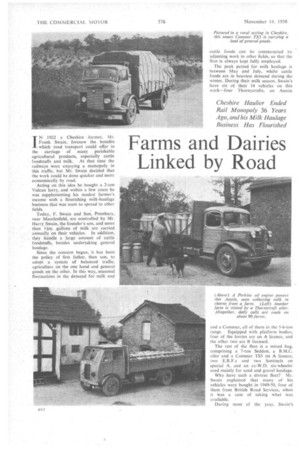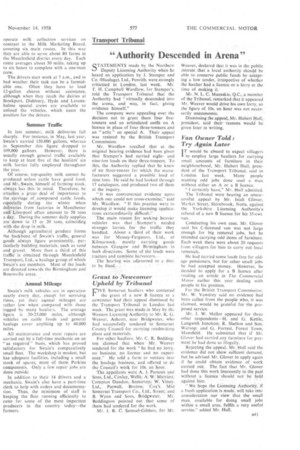Farms and Dairies Linked by Road
Page 74

Page 75

If you've noticed an error in this article please click here to report it so we can fix it.
Cheshire Haulier Ended Rail Monopoly 36 Years Ago, and his Milk Haulage Business Has Flourished IN 1922 a Cheshire farmer, Mk. Frank Swain, foresaw the benefits which road transport could offer in the carriage of many perishable agricultural products, especially cattle foodstuffs and milk. At that time the railways were enjoying a monopoly in this traffic, but Mr. Swain decided that the work could be done quicker and more economically by road.
Acting on this idea he bought a 2-ton Vulcan lorry, and within a few years he was supplementing his modest farmer's income with a flourishing milk-haulage business that was soon to spread to other fields. , Today, F. Swain and Son, Prestbury, near Macclesfield, are controlled by Mr. Harry Swain, the founder's son, and more than 14rn, gallons of milk are carried annually on their vehicles. In addition, they handle a large amount of cattle foodstuffs, besides undertaking general haulage.
Since the concern began, it has been the policy of first father, then son, to idopt a system of balanced traffic, agriculture on the one hand and general goods on the other. In this way, seasonal fluctuations in the demand for milk and cattle foods can be counteracted by adjusting work in other fields, so that the fleet is always kept fully employed.
The peak period for milk haulage is between May and July, whilst cattle foods are in heaviest demand during the winter. During their milk season, Swain's have six of their 14 vehicles on this work—four Thornycrofts, an Austin and a Commer, all of them in the 5-61on range. Equipped with platform bodies, four of the lorries are on A licence, and the other two are B licensed.
The rest of the fleet is a mixed bag, comprising a 7-ton Seddon, a B.M.C. oiler and a Commer TS3 on A licence, two E.R.F.s and two Sentinels on special A, and an ex-W.D. six-wheeler used mainly for sand and gravel haulage.
Why have such a diverse fleet? Mr. Swain explained that many of his -vehicles were bought in 1949-50, four of them from British Road Services, when it was a case of taking what was available.
During most of the year, Swain's operate milk collection services on contract to the Milk Marketing Board, covering six main routes. In this way they are able to serve about 80 farms in the Macclesfield district every day. Each rotate averages about 50 miles, taking up to six hours to complete with a one-man Crew.
The drivers start work at 7 a.m., and in bad weather their task can be a formidable one. Often they have to load 12-gallon churns without assistance, although when they reach the dairies at Stockport, Didsbury, Hyde and Levenshultne special crews are available to unload the vehicles, which eases the position for the drivers.
Summer Traffic
In late summer, milk deliveries fall sharply. For instance, in May, last year, Swain's carried 150.000 gallons, whereas in September this figure dropped to 109,000 gallons. However, there is usually enough general traffic available to keep at least five of the hauliers' six milk lorries fully employed throughout the year.
Of course, top-quality milk cannot he produced unless cattle have good food, and Mr, Swain, himself of farming stock, always has this in mind. Therefore, he attaches a great deal of importance to the Carriage of compound cattle foods, espeolall,y during the winter when deliveries from factories in Manchester aid:Liverpool often amount to 50 tons a day. During the summer daily supplies are down to 15 or 20 tons, coinciding with the drop in milk. .
Although Agricultural produce forms the backbone of Swain's traffic, general goods always figure prominently, particniarly Wilding materials, such as sand and gravel. More than a third of this traffic is Obtained through Macclesfield Transport, Ltd., a haulage group of which Swain's are members. Most of the loads are directed towards the Birmingham and Bournville areas.
Annual Mileage
Swain's milk vehicles are in operation nearly every day, except for servicing times, yet their aanual mileages are rather low when compared with those logged by many hauliers. The average figure is 20-25,000 miles, although vehicles on cattle foods and general haulage cover anything up to 40,000 miles.
All maintenance and most repairs are carried out by a full-time mechanic on an "as required basis, which has proved satisfactory for Swain's comparatively small fleet. The workshop is modest, but has adequate facilities, including a small stock of spares, most of them Perkins components. Only a few repair jobs are done outside.
In addition to their 14 dfivers and a mechanic. Swain's also have a part-time clerk to help with orders and documentation. Thus, the minimum of staff is keeping the fleet running efficiently to cater for some of the most important producers in the country today—the farmers.




















































































































